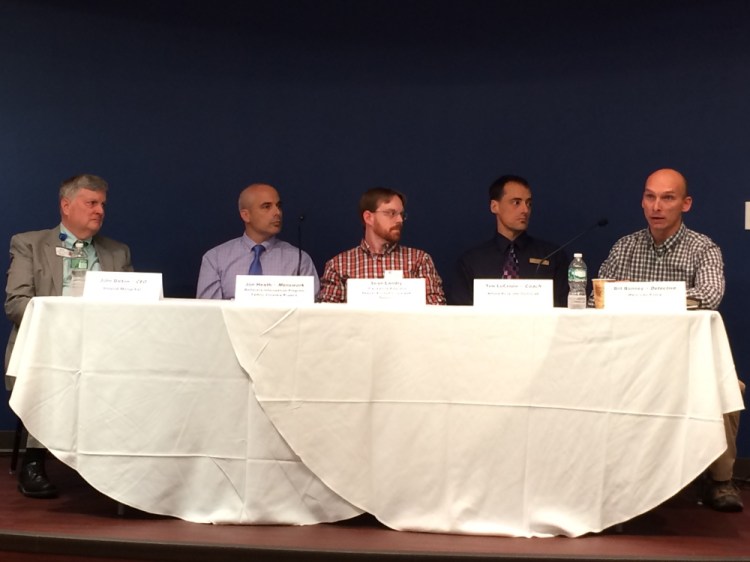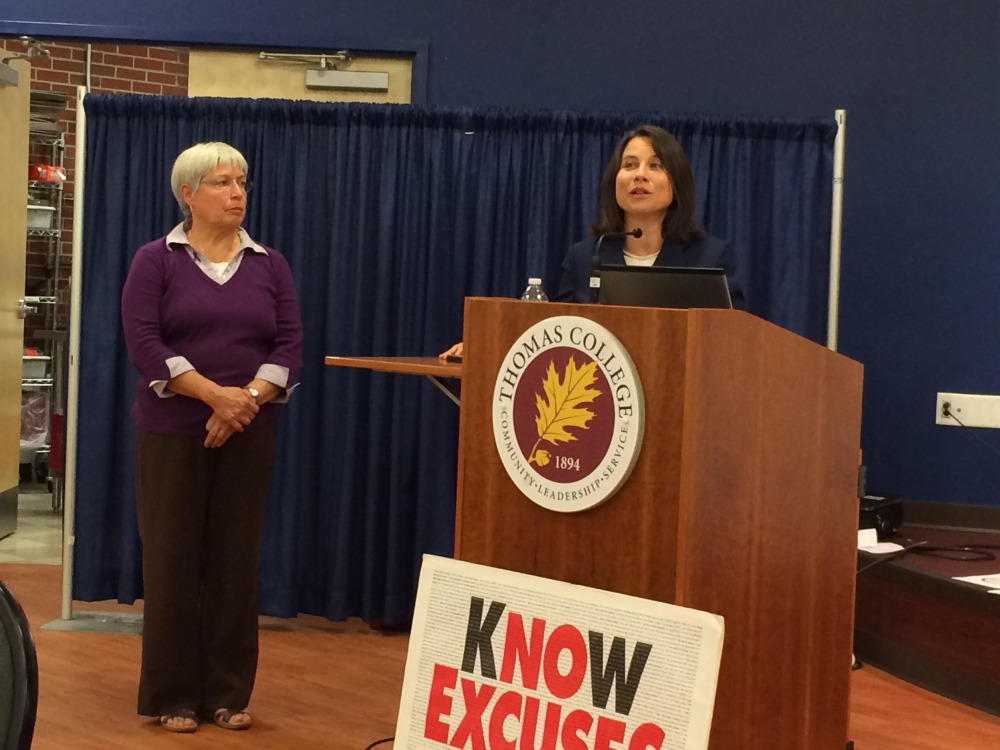WATERVILLE — A panel of male community members responded Wednesday night to a widely circulated video of former Baltimore Ravens football star Ray Rice punching his girlfriend and knocking her unconscious in an elevator.
The video, which was shown during a panel discussion at Thomas College on the topic of domestic violence and allegations of domestic violence by NFL players, shows Rice’s fiancee hitting him after the couple walks into the elevator and Rice in turn punching her to the floor and dragging her out of the elevator where someone else comes to help her up. The video has close to 10 million hits on YouTube.
“What I saw was someone who was not scared or shocked at all that he had just knocked out his partner,” said Jon Heath, who works at the Family Violence Project in Augusta as the coordinator of the Menswork program, a group that works to prevent men who have been convicted of domestic assault from re-offending. “His response was very nonchalant, like this happens a lot. You could see him kind of kicking her away as he picked up her shoes, like he was annoyed by it.”
“It was a completely horrific event,” said Sean Landry, a community educator at the Sexual Assault Crisis and Support Coalition. “And again, there wasn’t a lot of surprise or shock. It’s frustrating to see this kind of thing happen over and over again and go ‘Well, here we are again.’ There has to be a way to stop this.”
The discussion was part of an annual “Speak Out” event hosted by the Family Violence Project to mark Domestic Violence Awareness Month, which started Wednesday. The theme of this year’s discussion, which used the Rice video as a launching point, was how men can take a stand against domestic violence.
“We are starting on Oct. 1 by speaking out about domestic violence, and more specifically what’s in the media today, which is the NFL controversy, where domestic violence has definitely impacted that sport and how we view domestic violence,” said Nan Bell, a community educator at the Family Violence Project and the moderator of Wednesday’s discussion.
In addition to their reactions to the video, the panel was asked how the incident has affected them at work in the community and what changes the community can make to stop domestic violence.
Getting more people — specifically men — involved in conversations about domestic violence and speaking up about incidents of domestic violence is one way more men can help stop domestic violence, Heath said. Other members of the panel, which included John Dalton, the CEO of Inland Hospital; Tim LeCrone, a coach and the operations manager at the Alfond Youth Center in Waterville; and Bill Bonney, a detective at the Waterville Police Department, echoed the idea that speaking up is important, whether it is in direct response to domestic violence or about gender stereotypes and what appropriate behavior is, including on the sports field, where aggression often is seen as a good thing.
“This is a cultural circumstance. It’s not a situation that is socio-economic, and it’s seen across the board,” LeCrone said. “I think it’s really important to take steps to talk to kids and let them know this is not acceptable. Sports are amazing. They’re really wonderful, but at the same time we need to come at them with a responsible angle and not allow these athletics to enable this aggressive process.”
Other incidents of domestic violence, including allegations that Minnesota Vikings running back Adrian Peterson hit his 4-year-old child with a belt, have highlighted the issue publicly, but the panel also touched on the fact that these types of cases happen often in local communities.
There have been 10 homicides in Maine this year, seven of which were related to domestic violence, according to the Department of Public Safety. In 2013 there were 25 homicides in Maine, 11 of which were related to domestic violence.
Recent cases in the area include Leroy Smith, 56, stabbed to death in his Gardiner apartment by his son, Leroy Smith III, and the November 2013 stabbing of 24-year-old Jillian Jones by her boyfriend, Justin Pillsbury.
“It’s a problem. We have the issues right here in our backyard,” Bonney said. “Ray Rice is important to talk about because it gets people in our community interested, and more importantly, it gets men interested. But we have it right here, and as much as I dislike what Ray Rice did to his wife, I want to focus on this community and bring some resolution to what’s going on here.”
Also present at Wednesday night’s forum was Maeghan Maloney, district attorney for Kennebec and Somerset counties, who spoke about a new electronic tracking device that will be implemented for the first time this month in Somerset County. The device tracks domestic violence offenders to make sure they don’t violate protection from abuse orders. The program is just starting in Somerset County and was made possible with the help of the family of Amy Bagley Lake, who was killed by her husband, Stephen Lake, along with her two children in Dexter in a 2011 murder-suicide, Maloney said. If it is successful, it has the potential also to be used in Kennebec County.
“This is going to make a huge difference for victims,” Maloney said. “The family of Amy Lake has really pushed for this. They feel that if Stephen Lake had something like this, she would have known he was coming to the house. She had a protection order and she could have had a chance to be safe.”
About 40 people attended the forum, which also included a community conversation on how to change the culture of domestic violence.
“I think we also need to focus on letting young women and girls know that domestic violence is not OK,” said Zach Crimmin, 20, a psychology major at Thomas College. “I have a huge problem with that video. If parents are not around, their children may think that it’s OK for that kind of thing to happen. That’s someone’s daughter. There needs to be an emphasis on the fact that it’s not OK.”
Rachel Ohm — 612-2368
Twitter: @rachel_ohm
Send questions/comments to the editors.






Success. Please wait for the page to reload. If the page does not reload within 5 seconds, please refresh the page.
Enter your email and password to access comments.
Hi, to comment on stories you must . This profile is in addition to your subscription and website login.
Already have a commenting profile? .
Invalid username/password.
Please check your email to confirm and complete your registration.
Only subscribers are eligible to post comments. Please subscribe or login first for digital access. Here’s why.
Use the form below to reset your password. When you've submitted your account email, we will send an email with a reset code.